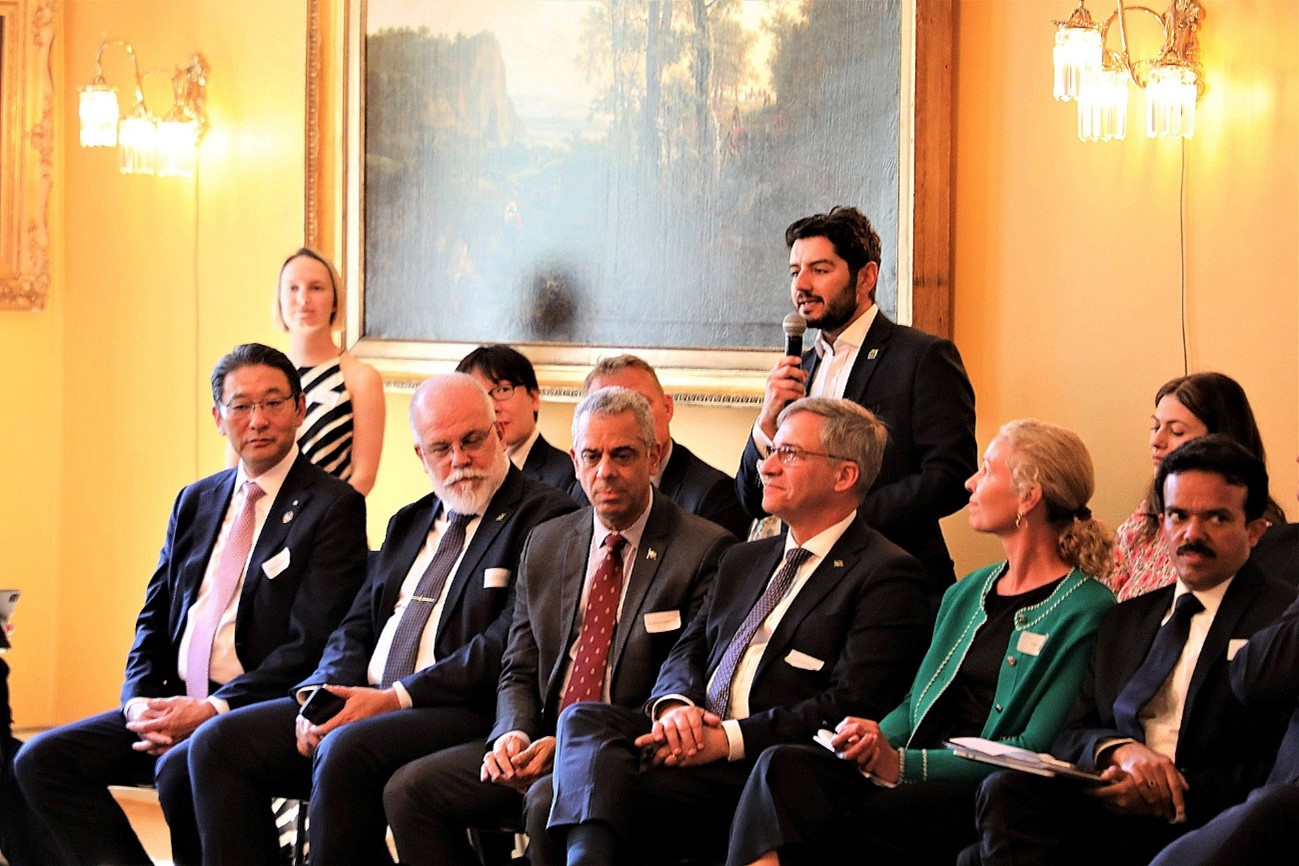Jun. 09, 2023
NYK Executive Proposes Transition Plan to Zero Emissions at International Conference Co-hosted by the United Nations Global Compact and Government of Norway
NYK participated in the "High-Level Meeting on Ocean: Global Shipping in the Midst of a Just Energy Transition" held in Oslo, Norway, on June 5. From Japan, NYK was the only private company or shipping company to participate in the meeting.
The meeting, co-hosted by the United Nations Global Compact (UNGC)* and the Government of Norway, is an international conference attended by ministers of various countries, as well as leaders and experts from the shipping industry. The meeting was held to share important issues among leading experts in the global shipping industry and to discuss effective action guidelines and measures to solve these issues. Sixty-five representatives from international organizations, universities, shipping companies, marine equipment manufacturers, financial institutions, classification societies, government agencies of various countries, etc. attended the meeting, namely Sanda Ojiambo, UNGC Assistant Secretary-General and CEO; Bjørnar Skjæran, Minister for Fisheries and Oceans, Government of Norway; and Kitack Lim of the International Maritime Organization (IMO).
At the meeting, the participants discussed responses to important issues such as decarbonization in the shipping industry and a "Just Transition"** associated with decarbonization measures. From NYK, Executive Officer Masahiro Takahashi spoke on the following points.
- NYK is working on the social implementation of ammonia, which is regarded as a candidate for zero-emission fuel for ships.
- To accelerate the decarbonization of the shipping industry, the IMO must realize a policy framework consistent with the 1.5°C target*** at an early stage.
- It is essential to have an adequate supply of drop-in fuels such as biofuels and zero-emission fuels such as ammonia. In particular, a policy framework that encourages co-creation crossing industries, involving the energy industry and governments, is necessary.
NYK will continue to lead discussions to solve key challenges facing the shipping industry, such as decarbonization and “Just transition.”

Masahiro Takahashi, first from left

Masahiro Takahashi, right
On March 10, 2023, the NYK Group released its medium-term management plan “Sail Green, Drive Transformations 2026 — A Passion for Planetary Wellbeing. ” The NYK Group is promoting growth strategies with ESG at the core, based on the Group’s basic philosophy of “Bringing value to life” and a new corporate vision for 2030, which reads, “we go beyond the scope of a comprehensive global logistics enterprise to co-create value required for the future by advancing our core business and growing new ones.”
Supplementary information
Meeting agenda
- Science-based, ambitious, and robust pathways for decarbonization of the global shipping industry
- Rapid upscaling of low to zero-carbon fuels, bunkering infrastructure, energy efficiency measures, and new technologies
- Opportunities and bottlenecks to reach zero emissions by 2050
- The role of the public and private sectors in driving decarbonization, including the role of governments, shipping companies, and investors
- The role of fuel producers, technology and renewable energy providers
- How are the shipowners reaching the 2030 and 2040 targets
- How to ensure the shipping industry’s transition is a “Just Transition,” which maximizes the social opportunities of the transition — including high-quality green jobs
Points confirmed at the meeting
- The global shipping industry, which moves 90% of all globally traded goods, and currently accounts for about 3% of global greenhouse gas (GHG) emissions, has a major responsibility for global decarbonization.
- For the shipping industry to reach total zero emissions by 2050, companies need to develop transition plans aligned with 2030 and 2040 targets that are consistent with the 1.5°C target.
- Leadership is needed to drive 1.5°C aligned 2030 and 2040 pathways for shipping.
- Scientific verification of transition plans, targets, and principles is required.
* UN Global Compact
The United Nations Global Compact (UNGC) is the world's largest sustainability initiative for the United Nations and the private sector (companies and organizations) to join hands to build a healthy global society. The Compact advocates 10 principles for protecting human rights, eliminating injustice, responding to the environment, and preventing corruption. NYK expressed its support in 2006 and is promoting voluntary efforts to act as a good member of society and achieve sustainable growth. In June 2022, NYK became the first company in Japan to endorse the UNGC's Sustainable Ocean Principles.
** Just Transition is a concept that aims to promote sustainable energy and industrial transformation while respecting the interests and rights of workers and communities. Just Transition specifically considers the following factors:
- Securing and creating jobs: Promote the creation of new sustainable industries while protecting jobs for workers.
- Appropriate training and education: Provide workers with opportunities to acquire new skills and help them cope with the transition to sustainable industries.
- Social inclusion: Support workers and communities affected by the transition to sustainable industries so that everyone can benefit.
*** The 1.5°C target is to limit the global average temperature at the end of the 21st century to about 1.5°C above pre-industrial levels. In the Paris Agreement formulated in 2015, the goal was positioned as an effort target to "limit the temperature rise to well below 2 °C and strive to approach 1.5°C." At the 26th Conference of the Parties (COP26) to the United Nations Framework Convention on Climate Change (UNFCCC) in 2021, countries and regions around the world agreed to "pursue efforts to limit the global temperature rise to 1.5°C," and the 1.5°C target became the de facto target of the UNFCCC.
Reference
Related press release
Related Sustainable Development Goals (SDGs)
.png)
The news on this website is as of the date announced and may change without notice.